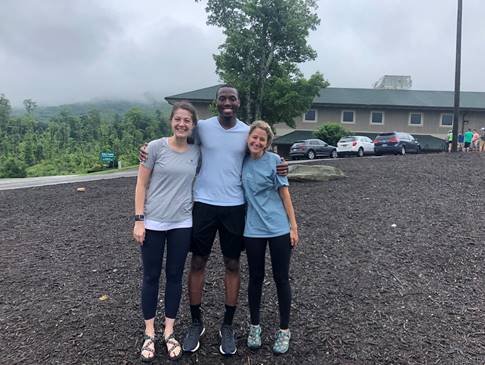 We often pursue careers that mirror our interests, but it is more rare that we can pursue careers that provide us with the opportunity to help others while helping ourselves. Living with Type 1 diabetes, Corey Colson, MS, RDN, LDN, CDCES, a diabetes education specialist with Tryon Medical Partners, has found a career that allows him to do just that. Speaking with Corey, it quickly becomes clear that he is passionate about supporting those living with diabetes, using his experiences and expertise to help them live full lives while managing their condition. In conversation, Corey provides insight into his journey and how he helps his patients:
We often pursue careers that mirror our interests, but it is more rare that we can pursue careers that provide us with the opportunity to help others while helping ourselves. Living with Type 1 diabetes, Corey Colson, MS, RDN, LDN, CDCES, a diabetes education specialist with Tryon Medical Partners, has found a career that allows him to do just that. Speaking with Corey, it quickly becomes clear that he is passionate about supporting those living with diabetes, using his experiences and expertise to help them live full lives while managing their condition. In conversation, Corey provides insight into his journey and how he helps his patients:
Corey received his Type 1 diabetes diagnosis as he was deciding his career path.
After graduating from high school, Corey’s parents encouraged him and his three brothers to pursue careers in the medical field. While Corey was accepted to nursing school, he quickly realized that nursing didn’t fit him well. After taking a nutrition class, Corey started to pursue sports nutrition so he could work with athletes. During that time, Corey was diagnosed with Type 1 diabetes.
“That changed everything for me,” says Corey. “I realized I wanted to work with people who had experienced everything I was dealing with.”
Corey pivoted to completing his education as a registered dietitian, focusing specifically on those patients with diabetes. While he is still able to work with athletes with diabetes, he says that his overall goal is to help people reach their goals, which vary from patient to patient.
A typical day as a diabetes education specialist involves establishing the best course of care with patients to allow them to live a long, healthy life with their diabetes.
 Corey sees a mix of Type 1 and Type 2 patients, along with some patients with gestational diabetes, all of whom see a Tryon doctor (either an endocrinologist or internal medicine doctor). Type 1 diabetes, typically diagnosed earlier in life, is a condition in which your body doesn’t produce insulin. Type 2 diabetes is a condition where your body can’t produce insulin or produces insulin that doesn’t work, and typically arises later in life due to dietary and lifestyle choices. Gestational diabetes occurs during pregnancy when your body produces too much glucose, and usually goes away once you give birth. Most often a one-time visit with follow-up monitoring and interaction, these patients see Corey to discuss what they’re struggling with specifically related to their diabetes, including the timing of insulin, their diet and how to deal with blood sugar issues.
Corey sees a mix of Type 1 and Type 2 patients, along with some patients with gestational diabetes, all of whom see a Tryon doctor (either an endocrinologist or internal medicine doctor). Type 1 diabetes, typically diagnosed earlier in life, is a condition in which your body doesn’t produce insulin. Type 2 diabetes is a condition where your body can’t produce insulin or produces insulin that doesn’t work, and typically arises later in life due to dietary and lifestyle choices. Gestational diabetes occurs during pregnancy when your body produces too much glucose, and usually goes away once you give birth. Most often a one-time visit with follow-up monitoring and interaction, these patients see Corey to discuss what they’re struggling with specifically related to their diabetes, including the timing of insulin, their diet and how to deal with blood sugar issues.
“I’m looking to understand what we need to do to get them healthy,” Corey notes. “I look at their carbohydrate intake, as well as their intake of proteins and fats. A lot of my job is about nutrition, but we also speak about physical activity and medication regimens and compliance.”
After this initial visit, Corey continues to monitor these patients remotely and follows up with them, either over the phone or in person within a month of the visit. Corey notes that the standard of care based on the American Diabetes Association is to close the loop with a patient, meaning that while he helps patients meet their goals, he also wants to ensure that he sets the patient up with overall lifestyle changes that can be maintained without specific oversight in the future.
Corey highlights that there is no one treatment plan that he uses for each patient.
“The biggest thing is to tailor each patient’s plan to their needs. Everyone’s diabetes is a little bit different.”
As a diabetes education specialist with Type 1 diabetes, Corey has learned to be consistent in his own diabetes journey.
Working with patients every day who have the same condition as himself, Corey says that consistency is most important in living with diabetes, rather than trying to be perfect all of the time. Managing diabetes has inherent ebbs and flows, and Corey says that his work has allowed him to realize that he needs to be consistent to be successful.
“I need to practice what I preach and remain vigilant. Working with patients who also have diabetes is a constant reminder that I need to hold myself to a high standard, as patients look to me as an example,” Corey says. “I want to continue to help motivate patients who are doing well by showing them my story.”

In addition, Corey tries to encourage young kids with Type 1 diabetes and an interest in diabetes education to pursue certification in the field, as it’s rewarding to have an opportunity to provide patients with insight that other educators might not have.
Finally, Corey, an ultramarathon runner, encourages patients that, “With diabetes you can do anything anyone else is doing. It just takes more planning, preparation and practice.”
Corey is excited to speak with others about his journey and questions around diabetes management. Reach out to Tryon today and speak with your doctor if you feel this education would help you in your diabetes journey.

